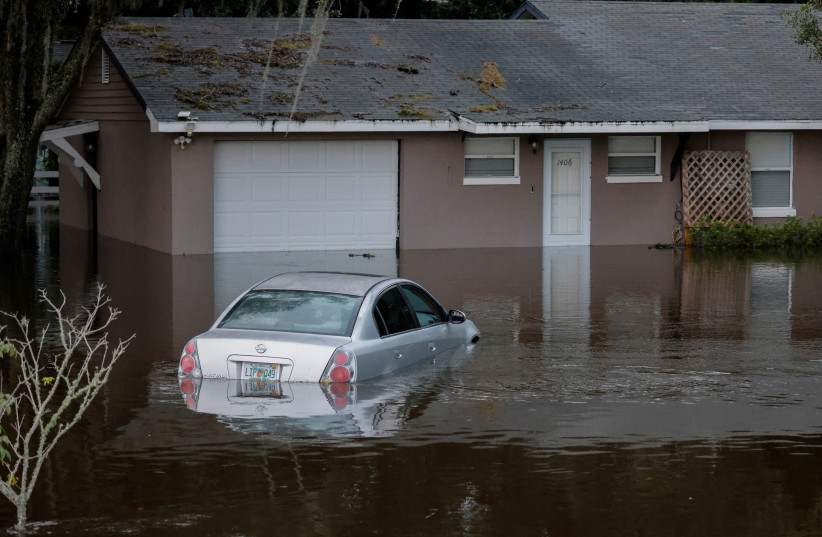My name is Hadas Rucham and I am part of United Hatzalah’s relief mission to Florida following Hurricane Ian and the terrible devastation that it left behind. I have been in Florida for almost a week helping people cope after having lost everything. When we arrived in Fort Myers after a long day of traveling, we met with local authorities to identify communities where our expertise in the field of psychological first aid and emotional stabilization could be of greatest use.
We were sent to a shelter for people displaced by the hurricane, where I met with Audrey*, who has there with her husband Gerard*. My colleague Einat tended to Gerard while I spoke with Audrey. Audrey recounted to me the terrifying experience of being home during the hurricane and seeing the water rise around the house. They had unsuccessfully attempted to seal the windows but their house, like so many, had eventually been flooded and everything in it utterly destroyed. Luckily, they had managed to escape in time together with their pets.
Audrey told me they had moved to Fort Myers four years ago after falling in love with the area while on vacation. Now, having lost her house and all of her belongings in the hurricane, she felt like they had committed a huge mistake by thinking that it could be more than a vacation spot. The sense of regret was a feeling she was struggling to cope with.
In order to alleviate her pain, I emphasized the fact that her family’s survival was a testament to their strength and that this, rather than the regrets, was the meaningful aspect she should try to focus on when thinking about the trauma she has just experienced. In a sense, I caused Audrey to fully realize for the first time that she was a survivor of a natural disaster. Thoughts about the loss of her house and belongings had prevented her from grasping the fact that she, her husband, and their pets, had survived a very dangerous situation.
Times of crisis
Her mood turned progressively more upbeat. We continued talking and I asked her to think about the anchors in her life and the resources that she has available to help her in times of crisis. She said she had not thought about this before and felt empowered.

As the conversation progressed I witnessed Audrey focusing less and less on her regrets. She even switched to asking me questions about myself and what had brought me to come and help. When she heard that I had put my life on hold during the Jewish holiday season and left my job, husband, and two young daughters, to help people like her in a foreign country thousands of kilometers away on a purely voluntary basis, she was very moved and broke out in tears. She blessed me that my daughters will follow the same path of taking action and helping others.
When we ended the conversation, Audrey was a different person than the woman I had met just half an hour earlier. She was no longer being eaten by regret. She thanked me profusely and said that I had given her a lot of food for thought, as well as inspiration to herself, to become a proactive force for good in the community.
My colleagues and I have had many similar conversations with many people here since the beginning of our mission. They have all lost so much, but they have also found the strength to survive and carry on. Although everyone copes with loss in different ways and the nature of the experienced loss varies widely, we are driven by the belief that every human being can go back to see themselves as the active writer of their own story and can determine how to approach that story. Our role is to use our professional skills to bring them to that realization as well.
*Names have been changed to protect the identity of the people involved
Hadas Rucham MSA is a social worker and Operations Manager of United Hatzalah’s Psychotrauma and Crisis Response Unit. She lives in Kedumim, Israel with her family and is currently a member of United Hatzalah’s relief mission to Naples and Fort Myers, FL to provide emotional and psychological stabilization to people who have been affected by Hurricane Ian. Rucham has been part of previous relief missions with the unit including to Pittsburgh following the Tree of Life Synagogue Shooting, the Champlain Towers Collapse in Surfside Florida, and most recently to the Ukrainian border with Moldova to assist in the refugee crisis that occurred during the first few months of the war in Ukraine.
